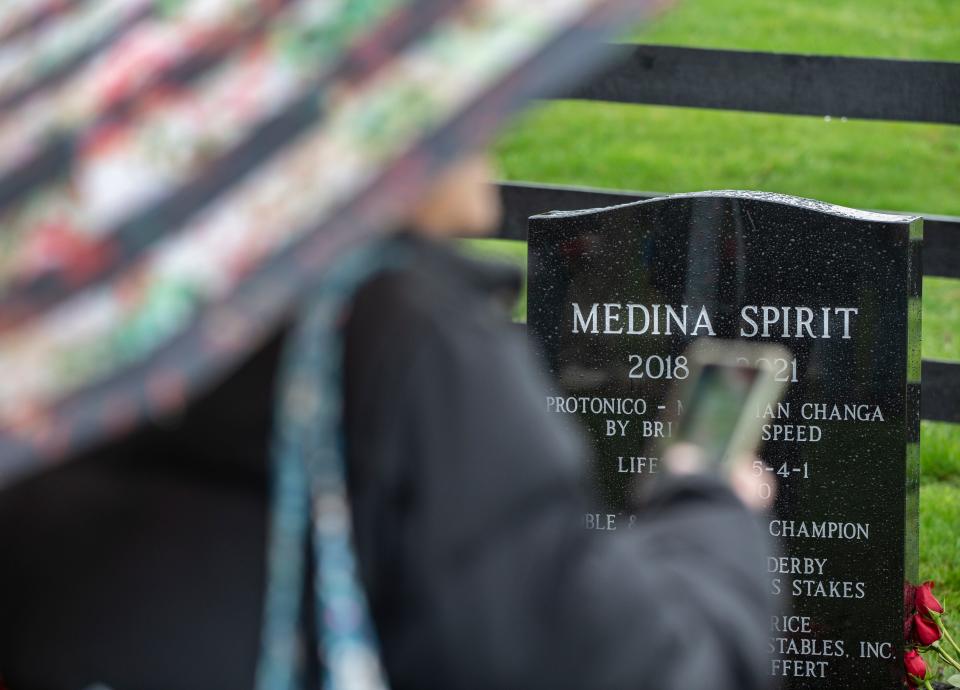I'm a horseman who follows the rules. Churchill Downs is right to expel Bob Baffert.
- Oops!Something went wrong.Please try again later.
Robert J. “Bobby” Martin (1928-2005) was a jockey with impressive athletic talent but was also no stranger to the stewards’ office. In 1950, his license to ride in Maryland was suspended for 10 years for betting on a horse other than the one he was riding. (Jockeys could bet on their own mounts with the wagers placed by the horse’s owner.) But, in 1955, some influential friends, including one Alfred Gwynne Vanderbilt, Jr., helped Martin get reinstated in Maryland and other racing states.
But when he showed up to ride at Monmouth Park the following year, the track’s president said “no,” citing the jockey’s “past record.” Martin filed suit in federal court claiming:
His New Jersey license gave him the right to ride at any racetrack in that state and
That Monmouth Park, because horse racing was so heavily regulated by the state, was a “quasi-public corporation” that could not arbitrarily exclude him.
Chief District Court Judge Phillip Forman dismissed the lawsuit holding that “[N]othing is more elementary than the right of a private corporation to admit or exclude any person . . . from its private property, absent some legal compulsion to the contrary [meaning race, religion, national origin]. In a sport where the greatest importance should attach to dissipating any cloud of association with the undesirable, and in which the appearance as well as the fact of complete integrity is of paramount consideration, to exclude [Martin] from riding because of his record was an understandably warranted exercise of discretion.” The decision was upheld on appeal.
Racetracks have 'inherent right' to determine eligibility
Much has changed in the practice of equine regulatory law since 1956, but one immutable truth has endured: Racetracks, as private businesses, have an “inherent right” to determine the eligibility of all owners, trainers and jockeys to participate in races held at those tracks. These issues have been much discussed lately with Churchill Downs’ decision to ban for a third consecutive year any horses trained by Bob Baffert from running in the Kentucky Derby.
This “exclusion” was Churchill’s enough-is-enough response to the disqualification of Medina Spirit after that Baffert-trained colt won the 2021 Derby but was later disqualified after a post-race drug screen tested positive for a medication banned on race day. This shock-heard-round-the-racing-world was preceded by Baffert’s filly, Gamine, being disqualified from her third-place finish in the 2020 Kentucky Oaks for the same offense.
Deaths at the track are tragic, but here's why I will always love horseracing.

The cumulative effect of these serial transgressions earned the six-time Derby-winning trainer a two-year expulsion from any racetracks owned by Churchill with a further review after that time. Connections with Derby-eligible horses trained by Baffert opted to transfer their 3-year-olds to other trainers during the “down” time, but this year those owners collectively announced that they wouldn’t run in this year’s race unless they could bring along their trainer to My Old Kentucky Home. Responding to this ultimatum, some people in the court of public opinion have called on Churchill to magnanimously stand down and allow Baffert’s horses entry to this year’s Derby if they have earned the requisite points.
Churchill Downs should persevere in its stand on principle
On behalf of the horsemen (and women) who follow the rules, on behalf of the betting public that wants an honestly-run sport, and on behalf of maintaining the integrity of the greatest horse race in the world that is the sole reason (plus Muhammad Ali) that anybody has ever heard of Louisville, Kentucky, Churchill Downs should persevere in its stand on principle and not let even the most accomplished horse trainer in history operate under his own rules of racing. Due to his charming nature and success, Bob Baffert has enjoyed special treatment from regulators all over the country (except in Kentucky) on medication violations and it, along with the collateral damage to our Commonwealth’s signature industry, has to stop.
Despite my fond memories working at Churchill when I was in college and law school, it’s not easy to defend a company that “enjoys” a reputation for corporate physicality (shall we say) and its decisions to close iconic racetracks Hollywood Park and Arlington Park still hurt. But our beloved Kentucky Derby, run for the 150th time this May, is bigger than any one man no matter how many Triple Crowns or Breeders Cup races that one man has won. If the price to let Mr. Baffert back on the grounds is to risk yet another drug violation and further damage to the beleaguered reputation of horse racing in general and to the Derby in particular, I’d say the odds don’t favor the house. For the long-term good of the sport, Churchill Downs management should stay the course all the way down the home stretch to the finish line and into the winner’s circle.
Is Churchill Downs right? Submit your letter to the editor here.
Bob Heleringer is a Louisville lawyer and a former member of the Kentucky General Assembly. He is the author of a legal textbook, Equine Regulatory Law, and can be reached at helringr@bellsouth.net.
This article originally appeared on Louisville Courier Journal: Churchill Downs is right. Baffert Deserves expulsion for drugged horse

